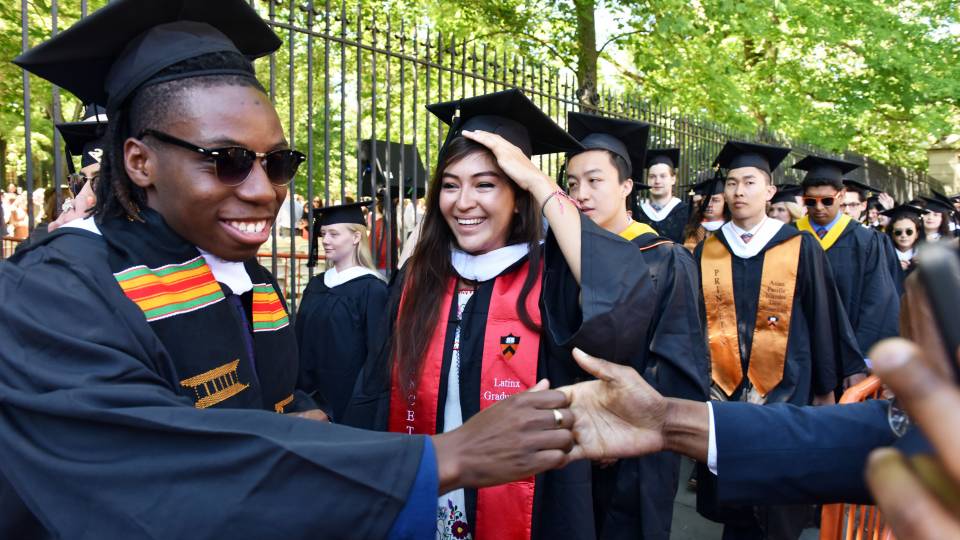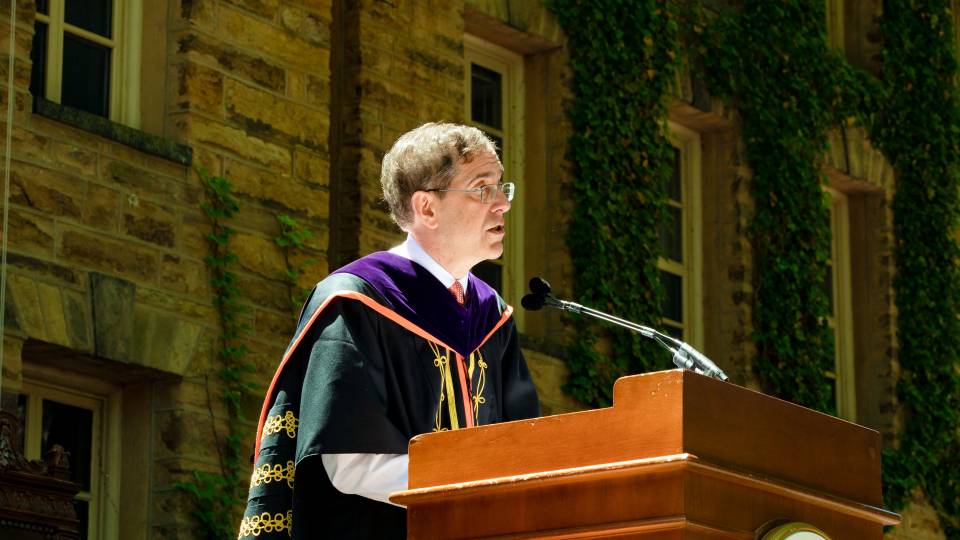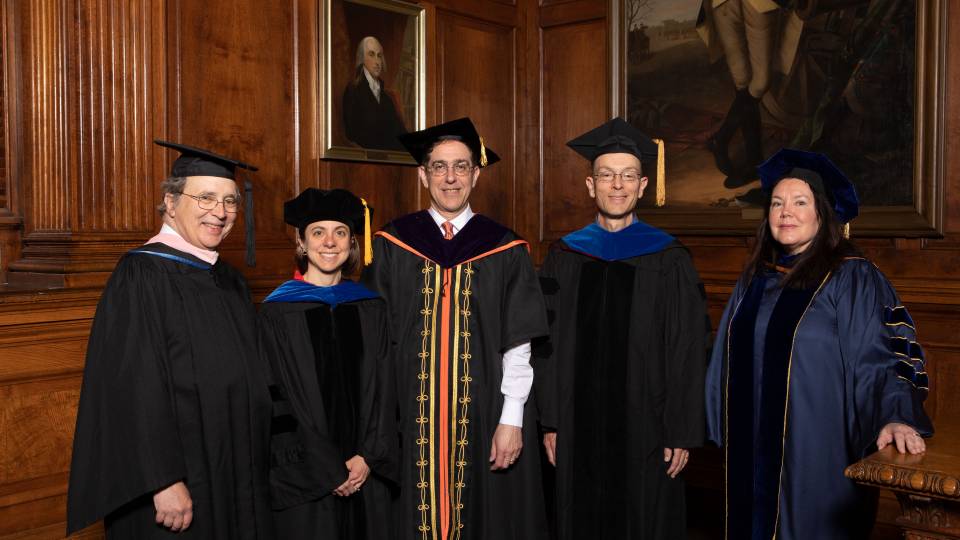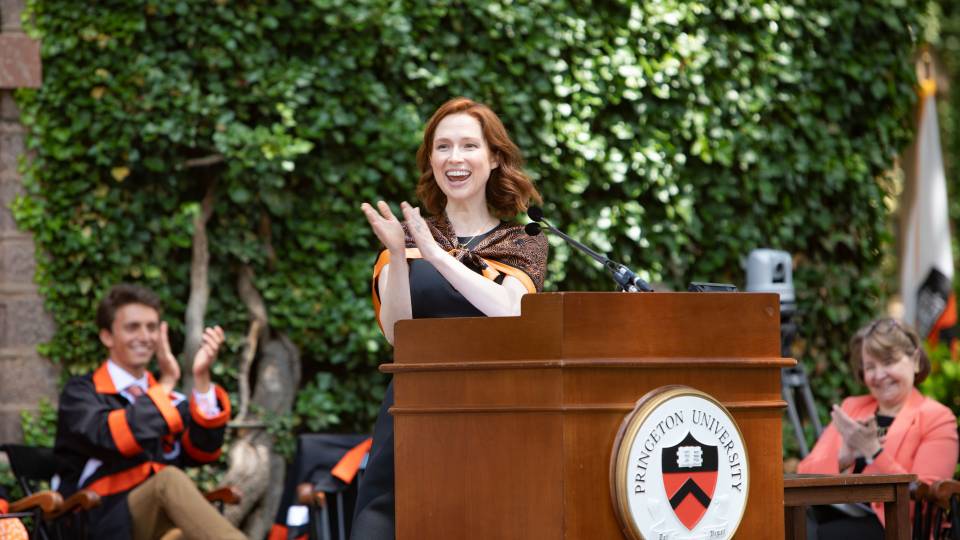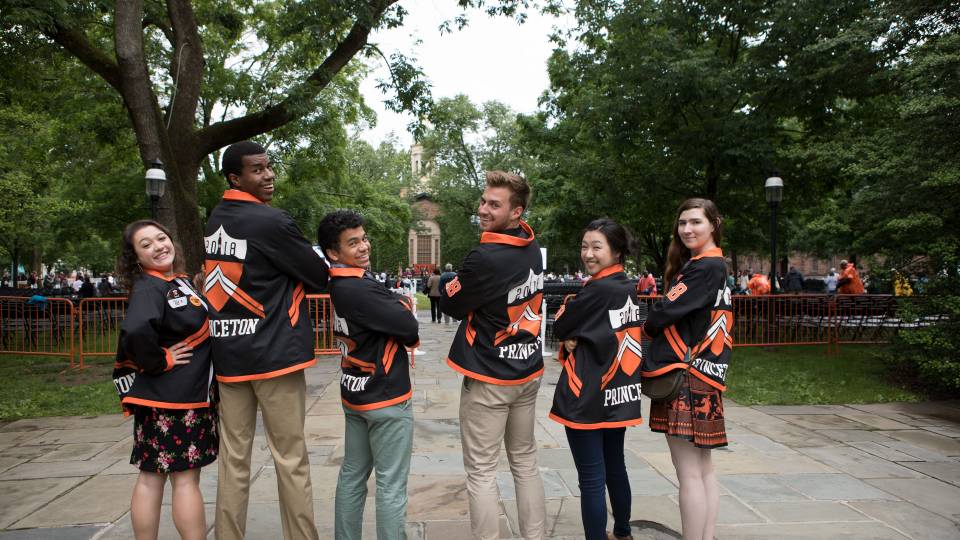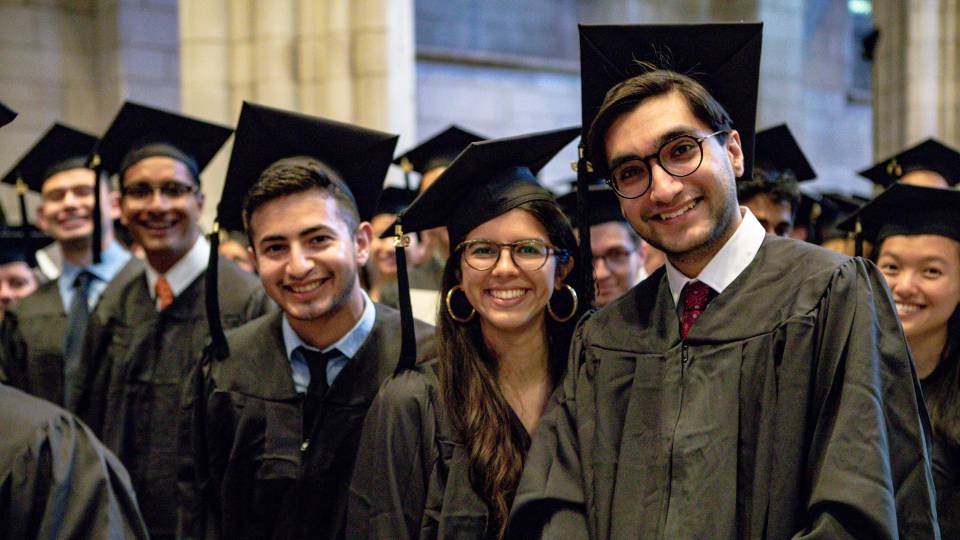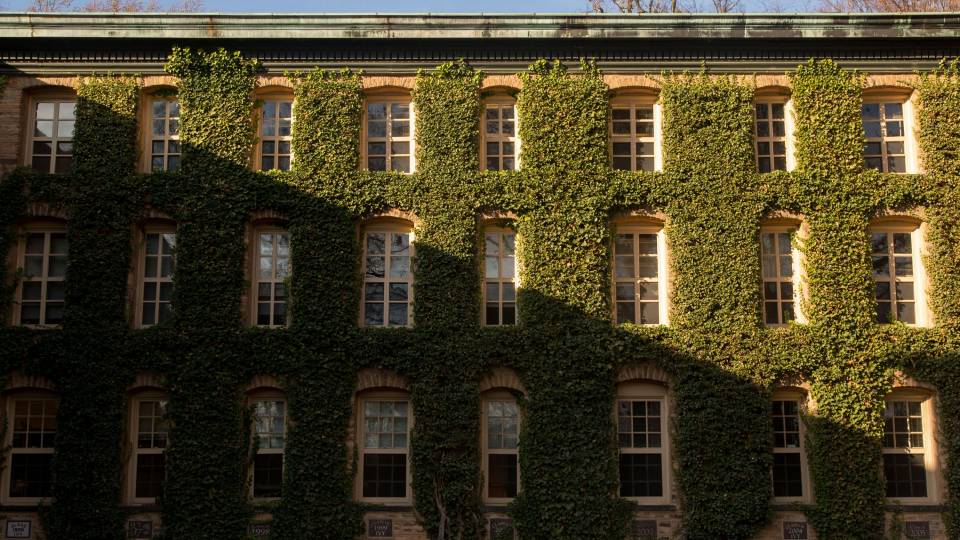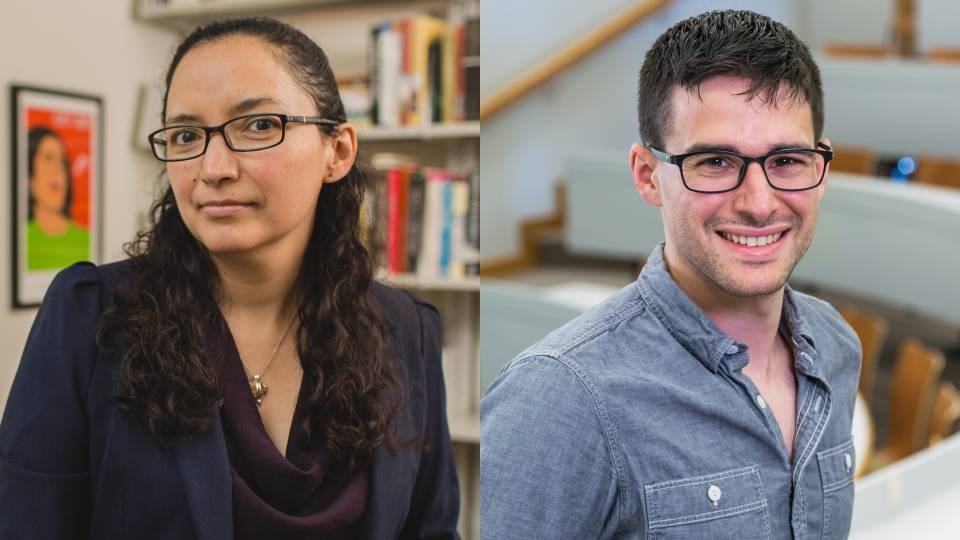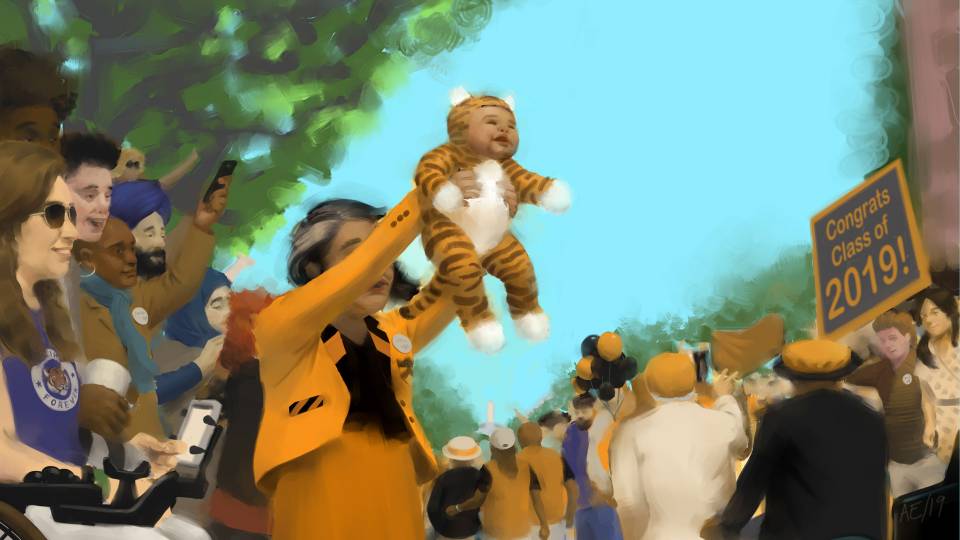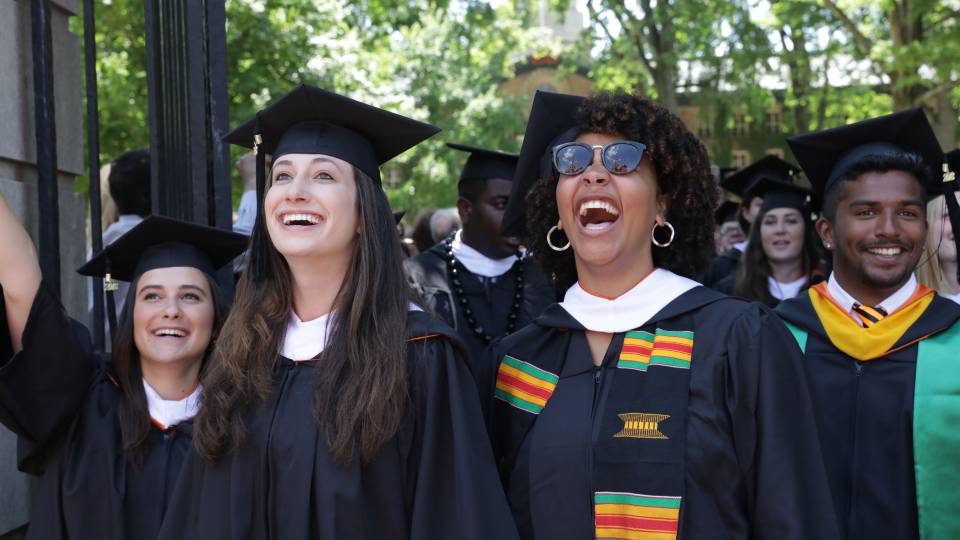Valedictorian Kate Reed, who graduated with a degree in history, tells the students that Commencement day is a “paradox of beginnings and endings.”
--As prepared--
To begin, words of gratitude. For friends and faculty, facilities workers and families. Behind each of us today there is an education that transcends books and classrooms, an education about how to be human in this world, and it is my great joy to be able to express my gratitude to the innumerable influences that have shaped me, that have shaped us.
Fifty years ago, in 1969, Princeton decided to go co-ed at the undergraduate level. I am here today not just—or even mainly—because of that decision, a decision as much about the needs of men and Princeton’s reputation as about educational equity for women, but also because of the countless people who have stood up, sat down, fought—and continue to fight—to make this place one that people of all genders and backgrounds can one day inhabit safely, joyously, and in justice. Thank you, also, to them.
Commencement connotes beginnings, and yet the valedictory address is a farewell address. As this day is a paradox of beginnings and endings, goodbyes and hellos, so it is a day of many feelings. Sorrow, gladness, bitterness, tenderness—complicatedness. Princeton is a complicated place, one which perpetuates deep injustices even as it brings people together in beautiful, unanticipated ways. Even as it creates the conditions for those contingent and serendipitous encounters that may change the courses of our lives. My own academic trajectory is the result of one such encounter. As a lost prefrosh visiting campus, I wandered into a course on modern Latin American history, thinking it was a lecture on popular music. Fifty minutes later, I left that lecture hall determined to take the full course as soon as I could. The professor of that class has become a dear mentor and friend, one of the people I am most glad to have met at Princeton.
In addition to this complicatedness and the bittersweetness of new chapters, nervousness has been my prevailing emotion this weekend. Really, I’ve been nervous since I learned that I was supposed to speak with you today. I am not a public speaker. On the few other occasions that I’ve given speeches—exactly twice—I have cried in the middle of both. I can’t guarantee that it won’t happen again.
In fact I have found that the only times when I am relatively more comfortable speaking publicly have been those occasions when I do not speak in my first language, which is English. Counterintuitive, perhaps, but I have a theory: I’m supposed to be good at English—excellent, in fact. To write in such a way that both the content and the form of my speech work together to create meaning; to speak well. It is partially on the grounds of these suppositions about my facility with words that I have been given a microphone this morning, and a podium to hide the fact that my legs are shaking.
In another language, it is easier for me to fully embrace the very obvious limits of my knowledge and capacity. To stop in the middle of a sentence and say, honestly, I don’t know how to say this. To let the people with whom I’m speaking help me to circumlocute, or perhaps even hit upon the right word. Apuesta is one I learned recently—“bet” in Spanish. In these moments of shared uncertainty, when a singular voice is inadequate, speech becomes conversation. We allow for gaps and pauses, moments of working through.
Allowing for these conversations, for these silences, can be difficult. We’re trained, in speech and in writing, to fill silence. To seek coherence, create clarity, build certainty. When we can’t do those things, when we are uncertain and muddled, we are more vulnerable. More aware of ourselves and of our limits. More aware, too, of the limits of language itself and of the ways in which the world will always escape the words with which we attempt to confine it. As a student of history, I spend more hours than I’d like to admit looking at old pieces of paper, trying to read worlds back into words. In the archive, one traces the interstices between the firmament of reality—those dusty, sometimes-moldy scraps—and flights of imagination—what was the world like for those papers’ authors? What did they see, hear, think? How did they understand the world? Missing from this exercise are those voices and stories that were never committed to paper, never shuffled into folders and slotted into boxes for curious students to come calling.
The absence of those voices may make the entire enterprise seem futile. The poet Francis Ponge writes that there will always be a fundamental difference between the subjects of his poems and the poems themselves; the subject will always be “more important, more interesting, more capable (full of rights).” So too will any present understanding of the past be fundamentally different from the past; so too will any human understanding of the world be circumscribed by the limits of individuality and human perception. This is not to say that we should not endeavor to understand our world more fully; Ponge was still a poet, after all, and there are still a few historians wandering around. I think they’re pretty cool. It is to raise certain questions, to ask what our world might look like if instead of locking doors and closing curtains when confronted with difference, we admitted our limitations and used them not to foreclose further discussion but to start conversation. To allow other voices and silences to alter our narratives.
It is to raise questions like: What if we were to dwell in that space of vulnerability, that uncomfortable, liminal, subjunctive space of openness and uncertainty? What if, when we went to office hours and told our professor we were having a hard time, they said not only “I’m sorry,” but also, as one of my professors said to me recently, “Hey, me too, let’s talk about it”? What if, instead of constructing seamless narratives, we left space for the unvoiced silences, acknowledging we may never be able to fill those spaces but giving them space nonetheless?
I myself don’t know the answer to these questions, what the world they suggest would look like. I struggle to be vulnerable, to admit to the edges of my knowledge, to my weakness and sadness and fear. The world we inhabit today is not always kind to this sort of honesty and the conversations it inspires. Which is why, in a world that prizes individual achievement, self-sufficiency, and private initiative, acknowledging vulnerability can be a somewhat radical, even subversive, act. It challenges the boundaries and borders that divide us, inviting empathy into places where emotions have long been discounted as signs of weakness, undermining hierarchies and reminding us of our fundamental, shared humanity. When building solidarity across these boundaries, across difference and inequality, vulnerability must be a precursor, especially for those who historically have occupied positions of relative power.
This is because vulnerability entails not only scrutiny of ourselves but also scrutiny of our position in the world. It asks that we be attentive to the ways certain voices and needs have been silenced or rendered invisible, while others are given microphones, podiums and platforms, and that we question these inequalities with care. That we notice the starkly unequal distribution of different kinds of vulnerability and voice. Princeton, in both its injustices and its ability to instill insight, has prepared us well to meet the world beyond FitzRandolph gate with this kind of attention and awareness.
So my hope for us, today, is that we can learn to walk out to where our experience frays away into the unknown,
and that here, rather than assume the universal applicability of our worldview or reject that which is challenging, different, or “other,” we approach it with humility. With a desire to understand. With an openness to encounter that may change our lives. I hope that we leave space for silence and ample room for uncertainty. That we can exist together in the complicatedness of this world without losing our capacity to be vulnerable, to be brave.
Class of 2019, it has been a sincere joy to be together this morning, one last time. Congratulations.




